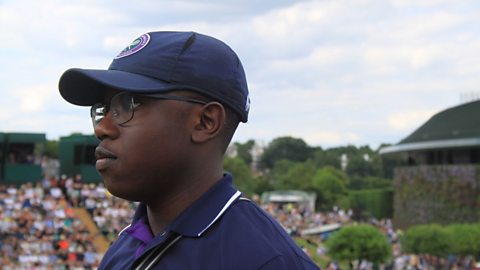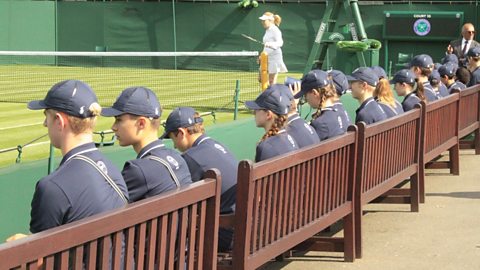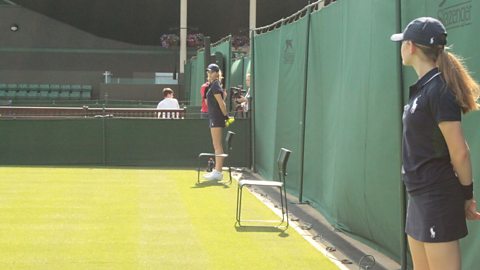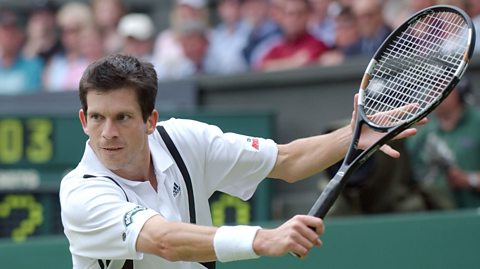Theyтre the unsung heroes of championships, and theyтre only 15-years-old. They work long hours on the courts at the All England Lawn Tennis Club, they have to be extremely physically fit, and know the game inside out.
No, weтre not talking about young players such as Cori Gauff. Weтre talking about the ball boys and ball girls (or BBGs as they're known in SW19).
The tradition at Wimbledon started in the 1920s, when young boys would be recruited to assist matches from Shaftesbury ТщЖЙдМХФs, institutions that trained the kids for a life in the Royal Navy. Then, from 1946, Barnardoтs (a school for orphaned and impoverished children) provided volunteers for 20 years, giving them work experience that would help them later on in life.
After that, lots of schools from all over London were turned to to find BBGs for the championships, and that is what still happens today. The kids are in all in Years 9 and 10 at secondary school so their training doesnтt interfere with their exams, and they have to undergo serious physical training to become one of the chosen few to feed balls to stars such as Roger Federer, Andy Murray and Serena Williams.
This year, obviously things are a little different. When the UK government made the decision to go into lockdown, the kids were still in the early stages of the BBG training process. Following the decision to cancel the Championships, schools were told that places in the training programme would be held until next year. The process will be as competitive as ever, though. The training is almost like an audition, so although all of those who were training this year will still have the opportunity to be a BBG in 2021, there's no guarantee.
We spoke to three who were recruited in 2019, to find out what itтs like.
We followed Clement, Jasper and Amelia's journey to Wimbledon.
From what Clement, Jasper and Amelia told us, itтs not an easy thing to do. As Clement put it: тintense is probably an understatement.т
He told us that when he first started he could barely finish the warm-up, and the the standard of the trainers is incredibly high: тthey expect nothing but the best from us.т
Jasper knew a bit more what to expect, as he had worked the 2018 championships and had been on the team responsible for the тshow courtsт, which are One and Centre. He said that once youтre actually working a match, youтre too focused to be nervous; itтs the build-up before hand that can be really difficult.

Amelia was extremely excited at the prospect of being тthe worldтs best at what we do.т
Despite how tough it could be, the excitement and pride the three felt was palpable. Theyтd been training since the start of the school year in September, and although Clement said at the start he didnтt think heтd be able to do it, by the time the championships rolled around they felt prepared and buzzing to crack on with the job at hand.
When we spoke to them at the Wimbledon grounds at the start of the tournament, they were tired, but over the moon to have made it. Amelia had just finished working a Maria Sharapova match, and she was thrilled. The hard work was all worth it in the end.


Top tips
If you want to be a ball boy or girl, these are some of the things you need:

- Good fitness: Youтll be working long shifts, on matches that could range from one hour to three in some cases. Youтll need to be quick and controlled, and this requires a high level of physical fitness.
- Great discipline: As much as youтll be running across the court, youтll be having to stand still for large periods of time too. As Sarah Goldson, head of the Wimbledon BBGs says, you need incredible discipline in order to stand still for so long and also remain entirely focused. Thereтs no time for hair fiddling!

- Teamwork: Youтll be working with the same people for two weeks, and you need to be extremely coordinated to be able to work effectively. Clement told us that sometimes if he could see that the other base was tired, heтd offer to get the ball, making it easier for everyone.
- Keep calm: Emotions can run high at high-stakes sporting events, and Wimbledon is no exception. Whilst it shouldnтt be OK for a player to take their anger out on you, Clement says itтs important to тkeep a cool headт if they do.
- Flexibility: When Amelia was telling us about the Sharapova match sheтd just worked on, she said it was important to know how to adjust to the individual playerтs needs. Some like to be fed balls from a certain point in the court, some donтt always want a towel - remembering these things and adapting quickly is key.
This article was published in July 2019

How to become a professional tennis player. video
Legends of the game with advice for the champions of tomorrow.

How many miles do we run during a tennis game?
Tennis is more than just hitting a ball - find out how much running is involved in a game.

Wimbledon in numbers: How many do you know?
Tennis balls, strawberries and rain. Test your Wimbledon knowledge with our quiz.
